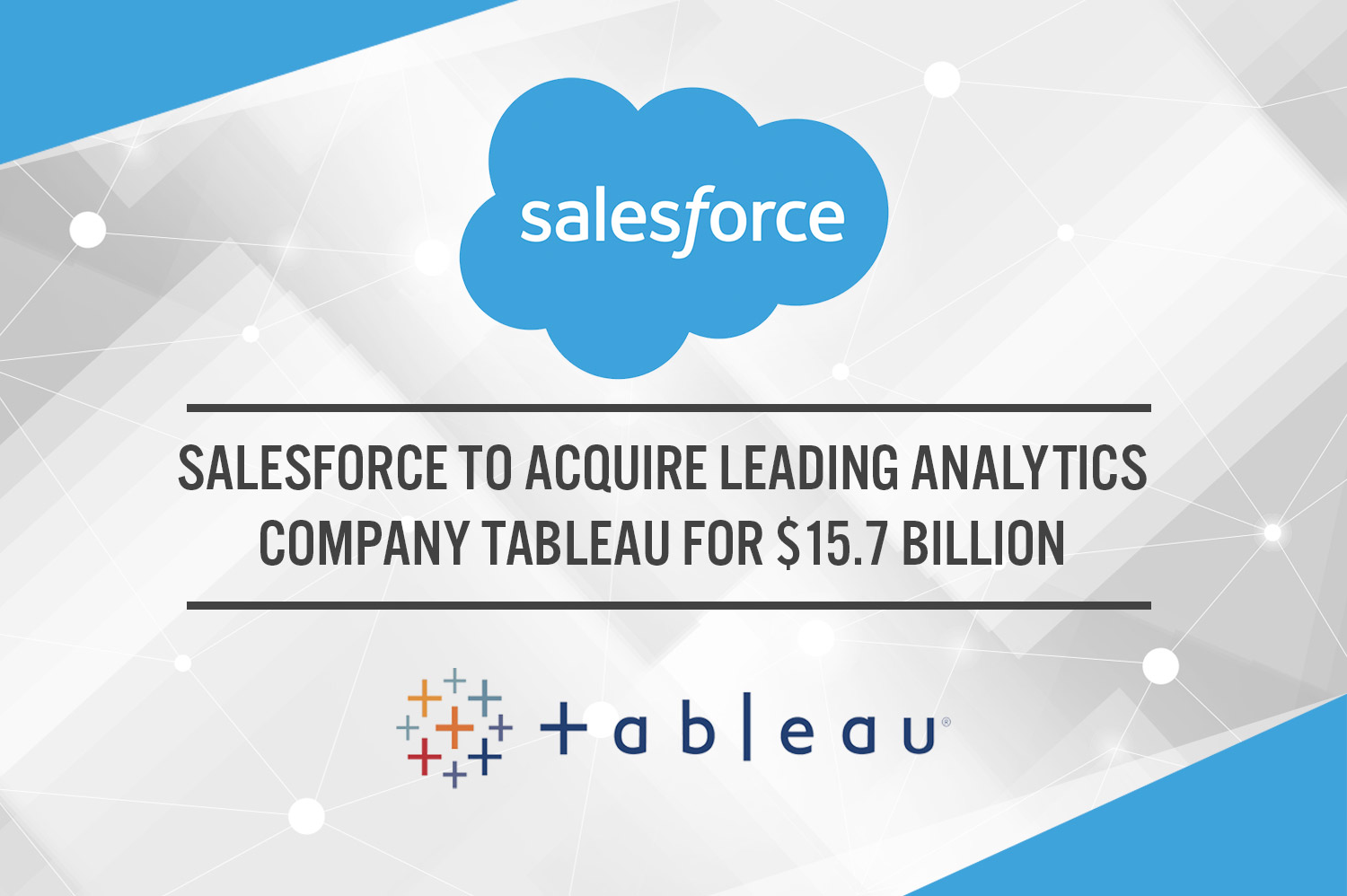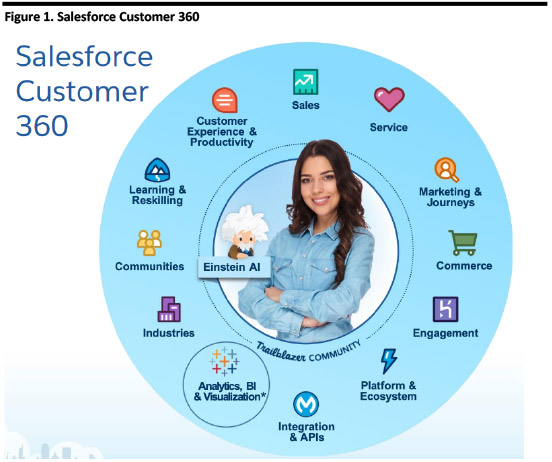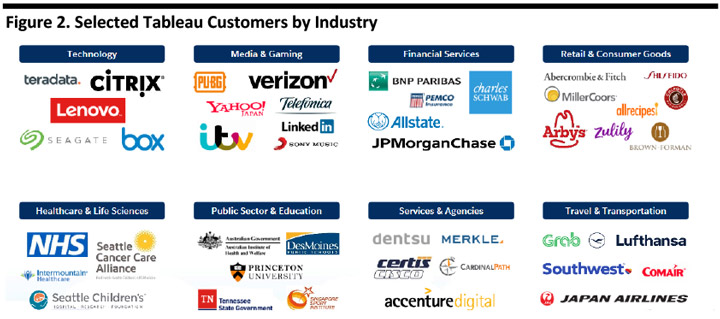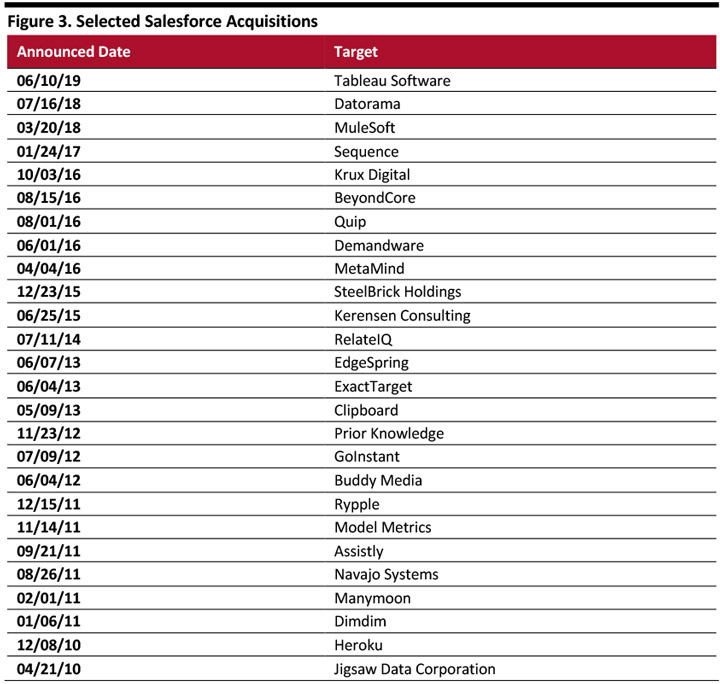
DIpil Das
Overview of the Acquisition
On June 10, 2019 Salesforce and Tableau announced an agreement under which Salesforce would acquire Tableau for an enterprise value of $15.7 billion in stock.
Tableau offers a self-service analytics platform with a community of more than one million members. The company expects to report revenues of $1.4 billion this year and has 4,200 employees.
The acquisition is expected to close during Salesforce’ 3Q ending October 31, 2019.
Coresight Research’s Take
Salesforce is enhancing its portfolio with the proposed addition of a leading business analytics and data visualization platform to its portfolio. The acquisition will add a community of customers in a broad spectrum of industries and enhance Salesforce’s analytics offerings, in addition to preventing the target company from ending up in a competitor’s hands.
Rationale for the Acquisition
Management says the combination of the two companies will accelerate clients’ digital transformations, enabling them to unlock data across the company, revealing deeper insights to make smarter decisions, drive intelligent customer experiences and accelerate innovation. The companies believe they are combining the leading CRM company, which enables companies to connect to their customers in new ways, with the leading analytics platform, a pioneer of self-service analytics that helps people see and understand data.
Management commented further that data is the foundation of every digital transformation, and the addition of Tableau will accelerate Salesforce’s ability to deliver customer success by enabling a truly unified and powerful view across all a customer's data.
The combination of Salesforce’s CRM software and the Salesforce Einstein platform provides AI-powered analytics for sales and marketing while Tableau is expected to further strengthen the newly combined company’s analytics capabilities to reach a broader set of customers.
The company envisions Tableau fitting within the Analytics, BI (business intelligence) and Visualization segment in its Salesforce Customer 360 platform as depicted below. The enhanced segment is circled in the diagram.
[caption id="attachment_90156" align="aligncenter" width="552"] Source: Company reports [/caption]
Digital Transformation: A $1.8 Trillion Market in 2022
Worldwide spending on technologies and services that to enable digital transformation is projected to increase from $1.18 billion in 2019 to $1.8 trillion in 2022, representing an 11.1% CAGR, according to IDC.
Within that market, the analytics and business analytics market is worth approximately $13.2 billion, growing at a 3.3% CAGR through 2022, according to estimates from Apps Run the World. That group pegs Tableau’s market share at more than 6%, after giants such as SAS, SAP, IBM and Microsoft.
More Detail on the Proposed Transaction
Salesforce will acquire Tableau in an all-stock transaction, in which each share of Tableau Class A and Class B common stock will be exchanged for 1.103 shares of Salesforce common stock, representing an enterprise value of $15.7 billion (net of cash).
The acquisition is expected to be completed during Salesforce’s fiscal third quarter ending October 31, 2019, subject to customary closing conditions.
Salesforce updated its fiscal 2020 guidance as follows:
Source: Company reports [/caption]
Digital Transformation: A $1.8 Trillion Market in 2022
Worldwide spending on technologies and services that to enable digital transformation is projected to increase from $1.18 billion in 2019 to $1.8 trillion in 2022, representing an 11.1% CAGR, according to IDC.
Within that market, the analytics and business analytics market is worth approximately $13.2 billion, growing at a 3.3% CAGR through 2022, according to estimates from Apps Run the World. That group pegs Tableau’s market share at more than 6%, after giants such as SAS, SAP, IBM and Microsoft.
More Detail on the Proposed Transaction
Salesforce will acquire Tableau in an all-stock transaction, in which each share of Tableau Class A and Class B common stock will be exchanged for 1.103 shares of Salesforce common stock, representing an enterprise value of $15.7 billion (net of cash).
The acquisition is expected to be completed during Salesforce’s fiscal third quarter ending October 31, 2019, subject to customary closing conditions.
Salesforce updated its fiscal 2020 guidance as follows:
 Source: Company reports [/caption]
Salesforce Acquisition History
Salesforce has been an acquisitive company, with 26 selected acquisitions during 2010-2019, with a total value of more than $34 billion and averaging $1.3 billion, including the proposed acquisition of Tableau.
[caption id="attachment_90174" align="aligncenter" width="720"]
Source: Company reports [/caption]
Salesforce Acquisition History
Salesforce has been an acquisitive company, with 26 selected acquisitions during 2010-2019, with a total value of more than $34 billion and averaging $1.3 billion, including the proposed acquisition of Tableau.
[caption id="attachment_90174" align="aligncenter" width="720"] Source: S&P Capital IQ[/caption]
Source: S&P Capital IQ[/caption]
 Source: Company reports [/caption]
Digital Transformation: A $1.8 Trillion Market in 2022
Worldwide spending on technologies and services that to enable digital transformation is projected to increase from $1.18 billion in 2019 to $1.8 trillion in 2022, representing an 11.1% CAGR, according to IDC.
Within that market, the analytics and business analytics market is worth approximately $13.2 billion, growing at a 3.3% CAGR through 2022, according to estimates from Apps Run the World. That group pegs Tableau’s market share at more than 6%, after giants such as SAS, SAP, IBM and Microsoft.
More Detail on the Proposed Transaction
Salesforce will acquire Tableau in an all-stock transaction, in which each share of Tableau Class A and Class B common stock will be exchanged for 1.103 shares of Salesforce common stock, representing an enterprise value of $15.7 billion (net of cash).
The acquisition is expected to be completed during Salesforce’s fiscal third quarter ending October 31, 2019, subject to customary closing conditions.
Salesforce updated its fiscal 2020 guidance as follows:
Source: Company reports [/caption]
Digital Transformation: A $1.8 Trillion Market in 2022
Worldwide spending on technologies and services that to enable digital transformation is projected to increase from $1.18 billion in 2019 to $1.8 trillion in 2022, representing an 11.1% CAGR, according to IDC.
Within that market, the analytics and business analytics market is worth approximately $13.2 billion, growing at a 3.3% CAGR through 2022, according to estimates from Apps Run the World. That group pegs Tableau’s market share at more than 6%, after giants such as SAS, SAP, IBM and Microsoft.
More Detail on the Proposed Transaction
Salesforce will acquire Tableau in an all-stock transaction, in which each share of Tableau Class A and Class B common stock will be exchanged for 1.103 shares of Salesforce common stock, representing an enterprise value of $15.7 billion (net of cash).
The acquisition is expected to be completed during Salesforce’s fiscal third quarter ending October 31, 2019, subject to customary closing conditions.
Salesforce updated its fiscal 2020 guidance as follows:
- The transaction is expected to increase FY20 total revenue by approximately $350 million to $400 million. FY20 Revenue is now expected to be $16.45 billion to $16.65 billion, up 24% to 25% year-over-year.
- The acquisition is expected to decrease FY20 non-GAAP diluted EPS by approximately $0.37 to $0.39. FY20 Non-GAAP EPS is now expected to be $2.51 to $2.53.
- Tableau Desktop: a self-service, powerful analytics product.
- Tableau Server: a business intelligence platform for organizations.
- Tableau Online: a hosted software-as-a-service (SaaS) version of Tableau Server.
- Tableau Prep: a data preparation product for combining, shaping and cleaning data.
- Tableau Public: a free cloud-based platform for analyzing and sharing public data.
 Source: Company reports [/caption]
Salesforce Acquisition History
Salesforce has been an acquisitive company, with 26 selected acquisitions during 2010-2019, with a total value of more than $34 billion and averaging $1.3 billion, including the proposed acquisition of Tableau.
[caption id="attachment_90174" align="aligncenter" width="720"]
Source: Company reports [/caption]
Salesforce Acquisition History
Salesforce has been an acquisitive company, with 26 selected acquisitions during 2010-2019, with a total value of more than $34 billion and averaging $1.3 billion, including the proposed acquisition of Tableau.
[caption id="attachment_90174" align="aligncenter" width="720"] Source: S&P Capital IQ[/caption]
Source: S&P Capital IQ[/caption]